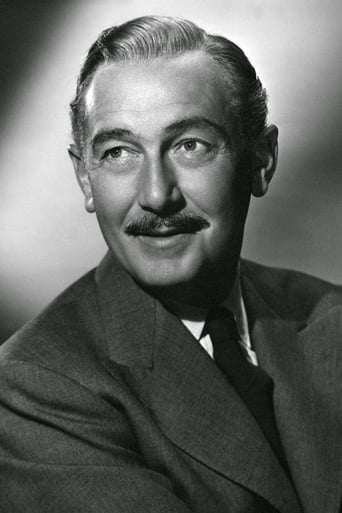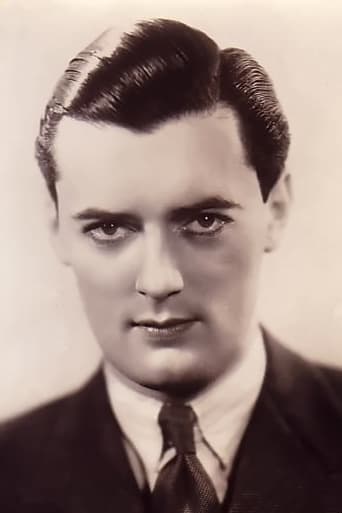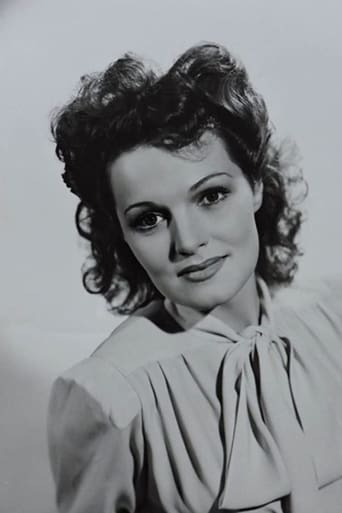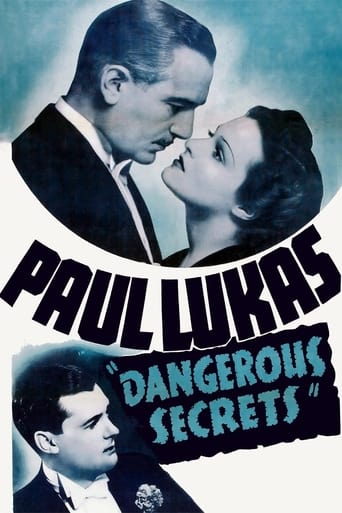
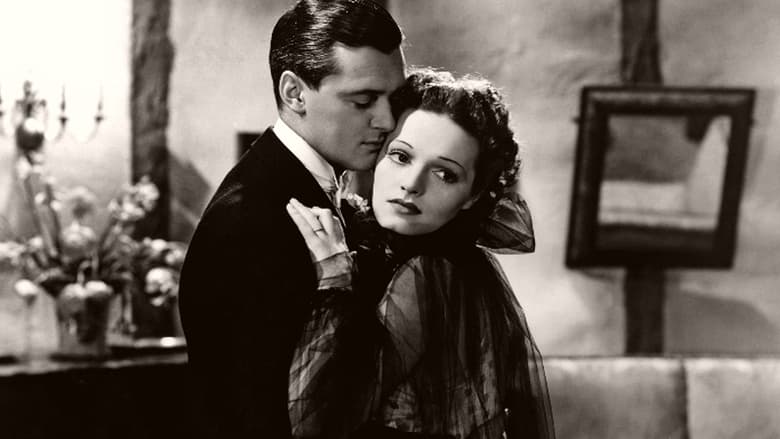
Brief Ecstasy (1937)
A remarkable story of love lost and found, as a young couple are separated by circumstance, and plunged into emotional turmoil by a reunion...
Watch Trailer
Cast
Reviews
Highly Overrated But Still Good
Great Film overall
Good movie but grossly overrated
Let me be very fair here, this is not the best movie in my opinion. But, this movie is fun, it has purpose and is very enjoyable to watch.
While aiding a damsel in distress by wiping liquid off her knee would get you a lot more than a slap across the face today, for handsome young Hugh Williams, it leads to an ill-fated affair that involves three basically nice people but creates the potential for scandal that even nice people have a tough time dealing with. Sent off on assignment after wining and dining feisty young Linden Travers, he returns to find her married to his mentor, dashing Paul Lukas. A jealous and suspicious housekeeper (Renee Gad) informs Lukas of her suspicions, having looked longingly at a photo of him, and insanely overwrought when he dismisses her with a month's notice. But as Lukas becomes exceedingly jealous, his fury and suspicions grow, risking his sanity.Beautifully filmed but often slow and pondering, this is artistically excellent but emotionally empty. More detail was put into the art direction and photographic effects than characterization. What starts off looking like a romantic comedy quickly turns melodramatic, and while it could go anywhere, it treads down the path of familiarity, one which has been done so much better. Little details concerning minor characters make a nice human touch, and the three leads are all excellent. But the real passion that would pull this together and raise it up a notch is missing. Rising tension at the end and a few interesting twists does make up for the sagging middle. This may not be an affair to remember, but there's a lot about it you won't soon forget.
This film was originally released as BRIEF ECSTASY and is a minor precursor of the famous BRIEF ENCOUNTER (1945) which David Lean was to make eight years later with Trevor Howard and Celia Johnson. Both express the dilemma of hopelessly intense and passionate love between two people who cannot be together because one of them is married and must remain faithful. Both films have anguished scenes of thwarted passion, desperate and harrowing temptation and heroic self-sacrifice. A similar theme was of course central also to the ending of CASABLANCA (1942). Those were the days of the stiff upper lip and of honour above everything. This film was released as DANGEROUS SECRETS in the USA, where it had 20 minutes of its original 72 minutes cut out of it, according to reviewer Ingenlode Wordsmith. I don't know what happened to the full 72 minutes, but a 66 minute version (4 minutes longer than the USA version) has now been released on DVD along with three other titles in The Ealing Studios Rarities Collection, Volume 2. The film is real lost gem, although one can see that numerous scenes appear to be shorter than they should be and have been cut. An entire song in a nightclub has been removed and replaced by a shadow of a saxophone player on the wall and other such effects, despite the fact that they had paid for the singer and we get a glimpse of her. (Was she a disappointing warbler, one wonders?) The film has a fine atmosphere and was directed by the French director Edmond T. Gréville, (1906-1966) whose original name was Edmond Gréville Thonger, but as Thonger, pronounced 'thong-ay', was clearly intractable to the English-speaking tongue, and was also less mellifluous, the director opted for his middle name as a surname, as seen in the credits. In all, he directed 40 films (the last in 1963), many of them in French and one apparently in Dutch (in 1948). The most famous is certainly PRINCESS TAM-TAM with the amazing Josephine Baker (1935), a film which no one interested in that icon of Paris culture between the Wars can afford to miss. BRIEF ECSTASY features a magnificent performance by the Hungarian émigré actor Paul Lukas, who became such a famous star of the second rank. Opposite him is the much younger Linden Travers (aged 24), who marries him because she believes her earlier love, played by Hugh Williams, has abandoned her by going to India and forgetting about her. (His cable asking her to marry him is swept up and thrown away by her cleaning lady.) Linden Travers is very much in the Celia Johnson mould. They were both febrile with an idealistic love, trembling with suppressed passion, their high-pitched voices quavering pitifully as they suffer. They were the 'victim women' who were fashionable in those pre-War days. How they trembled like reeds in the wind, how their tears flowed as their eyes shone with love! The film is an incredible time-capsule of forgotten manners and mores. I cannot imagine how any young person of today could possibly believe it, they way all those people dress and behave. Always in white tie or black tie at least, brave formality on display, and always erect and proud as they suffer. And those men! Such silly fellows! But I can assure all doubters that such people genuinely existed and were not just the products of film makers' imaginations. When I was young I knew many such people left over and grown old. And they were just like that. They were 'shall we stand on the deck stiffly at attention and go down with the ship with dignity' types. And the men were often so far from being masculine that many of them were whinnying ninnies. Such types were at the time called 'rigs', that being a term borrowed from the world of horses, where a rig is a stallion who sniffs round a mare but cannot be persuaded to mount her. Lukas is not a rig in the film, he is a solid professor, whose personal faults are jealousy, instinctive male domination ('my wife has quit her job in the laboratory and is having a more settled life at home now'), and dullness. Hugh Williams is what at the time was called 'a cad'. That means a heartless seducer who gets carried away by his passions and 'ruins a woman'. 'Rig' and 'cad' were good words, and must never be forgotten in these days when nobody cares, and when all fine distinctions have become meaningless in the amorphous welter of hyper-sexuality which has inundated our contemporary world like a tsunami of abandon. The film has many arty moments. Gréville created many effective silent scenes and a great deal of montage constructed of closeups and creative angles. Many of these have a great deal of impact, and the final shot could have been designed by Rodin. Gréville was clearly taking advantage of making a B picture where no one was watching what he was doing in order to inject a great deal of artistic innovation. Presumably most of the cuts were of such material, though much of it survives and is impressive. The film is such a period piece that you have to be prepared for everybody to be a bit too precious, because everyone then really was a bit too precious. Call it 'time travel'.
An interesting film that makes a good deal out of a slight scenario. It is only 72 minutes long (out of which the Americans contrived to cut a full twenty minutes for the US release, with disastrous effect) and a good proportion of even that slim running time consists of wordless shots. Greville's claim was that he had used 'silent movie technique', and in fact when you see this picture that style is very recognisable: one frequent trick is to cut from a shot of one object (e.g. a milk bottle being put down on the doorstep) to another object (e.g. a wine bottle being put down in a restaurant) at precisely the same shape and angle -- I found this a little too obvious as a transit from one scene to another, but it's clearly a stylistic decision. A classic silent movie technique is seen in the way that the scene of the girl falling in love is shown as a montage of the couple together throughout the evening, as the camera swirls around the room and the shadow of the singer on the dance floor is overlaid to what will, later in the story, be recalled as "their" song.The plot is simple but pleasantly unexpected, at least by modern conventions; in the 1930s it may have been a less striking ending. (It is interesting to see a depiction in this era of a 'career woman' obviously struggling with being relegated to domesticity, although this is one element that the plot doesn't really resolve.) The sets (the lab, the 'country house', the pub) look distinctly familiar from other 1930s productions -- although this may simply mean that they were true to life! -- but skillful use is made of the limited space; oddly enough it is the 'external' sequences that look either stagy or simply cut out of stock footage. The film is brought to life with touches of humour, both visual and verbal, and we are allowed to care about all the characters, even poor jealous dried-up Martha.The three principals are all very good (Miss Travers gives an amusing example of acting 'bad acting' as her character tries to lie to her husband, but is otherwise note-perfect on what could have come across as melodramatic dialogue); Hugh Williams is perhaps the weakest, but then his character is ultimately little more than a cipher to trigger the action. Among the supporting cast, Renee Gadd stood out for me in her handful of early scenes as the heroine's world-weary best friend, while Norman Pierce is somewhat over the top in his comedy part of Mine Host at the country inn.This is a B-movie with artistic aspirations, which on the whole succeed. It scores on the pared-down script and cinematography fronts, and in particular for its attention to unspoken detail: it is not a great picture, was never aimed to be one and will never be one, but it is memorable among its kind. A solid 7/10, which sometimes reaches to be an 8.
Edmond T Greville left his native France to direct movies in England where actors were more professional.That's what he claimed.At the time,however,French cinema was at the height of its power (Carné,Renoir,Duvivier,Pagnol,Guitry,Grémillon,Christian-Jaque and more).And after producing a turkey about a female spy during WW1,Greville made another dud about the eternal story of the love triangle . Woman meets a handsome young man but she marries a scientist since the hunk had to fly to India in order to.... (I have already forgotten the reason why,and however I saw the movie last Monday).And the hubby is of course a greybeard who could be his wife's father.And of course ,he has a housekeeper,secretly in love with him,and jealous of her new mistress.Then the former lover comes back....
